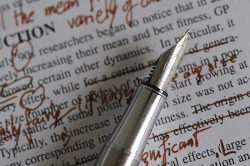Finishing Touches
Big6 terms: Synthesis; Evaluation
Editing
Try these tips when editing/revising your paper:
1. No matter what, do not edit it immediately after finishing. Otherwise, you won't catch as much as you will if you take a break! Your brain "self-corrects." Slowing down and taking a break between writing and editing helps with this.
2. Start at the conclusion and work your way back to the introduction, reading each paragraph silently. This forces the brain to slow down. If you tend to struggle with grammar and spelling, then literally read each word backwards to catch more mechanics-related errors.
3. Read it aloud to someone; then have the person read it aloud to you.
4. Have another student and at least one adult read it silently.
5. Compare it to your teacher's rubric/expectations. Compare to your Big6 organizer.
Click below to download editing marks.
1. No matter what, do not edit it immediately after finishing. Otherwise, you won't catch as much as you will if you take a break! Your brain "self-corrects." Slowing down and taking a break between writing and editing helps with this.
2. Start at the conclusion and work your way back to the introduction, reading each paragraph silently. This forces the brain to slow down. If you tend to struggle with grammar and spelling, then literally read each word backwards to catch more mechanics-related errors.
3. Read it aloud to someone; then have the person read it aloud to you.
4. Have another student and at least one adult read it silently.
5. Compare it to your teacher's rubric/expectations. Compare to your Big6 organizer.
Click below to download editing marks.
| editing.doc |
Evaluating
Click here for a Big6 evaluation checklist.
Your teacher should not be the first person to evaluate your work! Be sure to complete self-evaluation, as well as a peer or mentor evaluation. Evaluating is more than editing; it is thinking critically about how you have synthesized all of the information into your final product. Remember the Big6 points and judge for your product's effectiveness and efficiency.
The “Big6™” is copyright © (1987) Michael B. Eisenberg and Robert E. Berkowitz. For more on Big6, visit: www.big6.com
Your teacher should not be the first person to evaluate your work! Be sure to complete self-evaluation, as well as a peer or mentor evaluation. Evaluating is more than editing; it is thinking critically about how you have synthesized all of the information into your final product. Remember the Big6 points and judge for your product's effectiveness and efficiency.
The “Big6™” is copyright © (1987) Michael B. Eisenberg and Robert E. Berkowitz. For more on Big6, visit: www.big6.com

